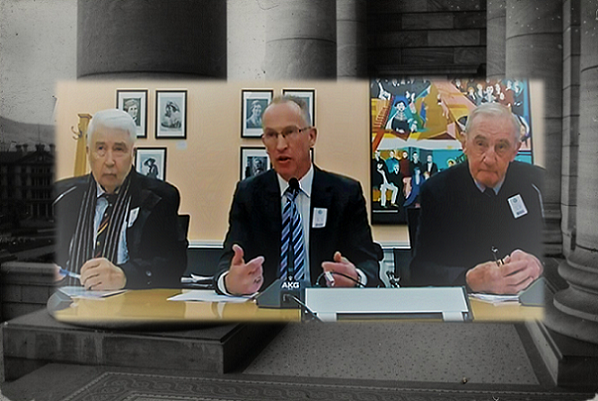Following is a transcript of the Association's oral submission to the the Economic Development, Science and Innovation Committee, on 5 August 2020.

John Morrison (Vlce-President), Gordon Noble-Campbell (Chairman) and Andy Leslie (Patron)
Thank you for providing this opportunity for an oral submission.
With reference to the seven recommendations contained in our written submission, the Association would like to highlight the following three points:
a. we do not believe the drafting of the Bill has adequately canvassed incorporated sport clubs or considered their specific community role in creating social well-being;
b. we suggest, given the community, volunteer, non-profit focus of most incorporated societies, the Bill is being considered by the wrong Select Committee; and
c. if passed into law as currently drafted, this Bill is likely to become known and remembered as, "the law of unintended consequences".
We recommend that Parliament send this Bill back to the community for further consultation, with the goal of seeking to ameliorate rather than increase the regulatory burden on incorporated sport entities which comprise a third of all incorporated societies, and which are largely operated by volunteers, for the physical and mental well-being of all. The Association is not opposed to modernisation of the current Act, provided the reform process has adequately taken into consideration the practical aspects of the operating environment for incorporated sport entities. The Association’s research suggest this has not occurred and that sport clubs struggle to comply with the existing regulatory requirements, let alone the increased obligations contained in this Bill.
By way of example, nearly 1,000 incorporated sport entities have been dissolved by the Registrar of Incorporated Societies in the past five years, in many cases involuntarily, for failure to comply with the requirements of the existing Act. Our research shows over a third of those dissolved continue to operate regardless, in many cases unaware of their dissolved status, the reasons for their dissolution (and the implications), and the potential remedy of revocation. When made aware of their status by the Association, many dissolved entities do not know what steps they needed to take to resurrect their incorporated status.
Based on a survey of incorporated sport organisations undertaken by the Association since the Bill was introduced to Parliament in April this year, 98% of respondents were not aware of the Bill and had not been contacted by their national governing body concerning their obligations, should it pass into law. When this reform was first mooted by the Law Commission in 2013, it received 208 submissions, (a 0.9% representative sample of all incorporated societies). We are therefore not surprised by a general lack of awareness of the reform process eight years later. Of the submissions received by the Law Commission in 2013, only 12 were from sport entities. Despite comprising around one-third of the community organisations affected by the proposed reforms, only 0.05% (a half of a tenth of one per cent) of incorporated community sport organisations provided input to the consultation process.
The disconnect between Parliament and the key constituents affected by this reform is highlighted by the fact that this Committee is responsible for the consideration of legislation relating to: business development; tourism; Crown minerals; commerce; consumer protection and trading standards; research; science; innovation; intellectual property; broadcasting; communications; and information technology.
None of these areas appear to have a direct relationship to the core constituents of incorporated societies in general, and incorporated sport entities in particular. The Association suggests that this Bill should instead be considered by the "Social Services & Community" Select Committee which has a focus on social development; children, young people and seniors; Pacific peoples and ethnic communities; arts, culture and heritage; sport and recreation; and the voluntary sector. These areas are representative of the majority of incorporated societies which are not within the focus or scope of this Committee.
In summary, the passage of the Incorporated Societies Bill into law is likely to result in unintended consequences for incorporated sport entities in New Zealand, which have not been fully considered in the drafting of the legislation. We believe that the Bill (as currently drafted) is likely to: accelerate the voluntary and involuntary dissolution of incorporated sport entities; impair the recruitment of volunteers to govern and administer sport clubs; reduce the ability of sport clubs to deliver the physical and social benefits of organised amateur sport to local communities; and as a result; and decrease the overall level of participation in sport clubs nationally.
If this occurs, it will not be in the best interests of New Zealand and its proud sporting heritage. Nor will the new legislation meet the Government’s goal of improving the physical and mental well-being of New Zealanders.
You can read the Association's Media Release following the oral submission, by clicking here.
